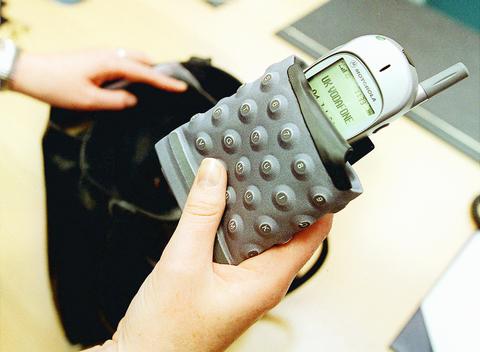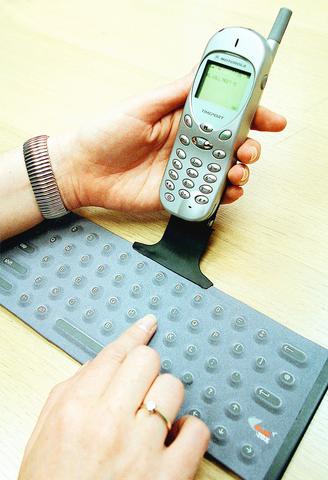Text messaging on mobile phones is all thumbs. A British company believes the best way to get the other eight fingers involved is by going soft.
After sneak peeks at New York's Museum of Modern Art and the IT Expo in France, ElectroTextiles Co Ltd is marketing a flexible, plug-in keyboard this year for mobile phones and personal digital assistants.

PHOTO: AP
Although similar devices are already on the market, this one uses the company's ElekTex fabric, a soft, water-resistant material that can receive and transmit electronic impulses without traditional wiring or circuitry.

PHOTO: AP
The fabric turns keyboards into bumpy placemats that can be folded up and slipped into a pocket, or act as a wraparound cover for the device they're attached to.
The soft keyboard is the first in a line of products that will use ElekTex. Also on tap: squishy mobile phones that conform to a pocket and survive a drop onto the sidewalk, and a smart car seat that automatically adjusts to the proportions of its occupant.
Chris Chapman, co-founder of ElectroTextiles, isn't worried about debuting ElekTex in a niche already crowded with keyboard attachments made by Palm Inc, LM Ericsson and Motorola Inc.
He's confident his device will be embraced by mobile phone users tired of pecking away at a telephone pad. At about 28 grams, it's light -- and it's flexible.
"You pull the cover off, drop it down and start typing," he said. "People's first impressions are, `Whoa, it's fabric, it must be a little flimsy.' But it's very durable. ... It takes a good whack, it rolls up, it scrunches up."
But "texters" -- mostly teen-agers and 20-somethings who can bang out 100-character messages in a flurry of thumbs -- are less enthusiastic about such keyboards.
"Personally I don't have a problem using the standard phone keypad to type messages," said Daniel Thornton, a 20-year-old student from Peterborough, England, about 160km north of London.
"Right now I send upwards of 200 text messages a month, but I don't think it's worth the expense of buying a keyboard for the purpose of text messages. Having an extra piece of equipment would also reduce the portability aspect."
Chapman would give no details on price or compatibility with specific devices. The keyboards will be manufactured by an undisclosed partner.
For new or less-skilled text messengers, typing on phone keypads can be frustrating, even with the growing lexicon of shorthand text lingo.
To illustrate, one must press the "7" key four times to get the letter "s." Typing the word "difficult" requires 22 keystrokes, and symbols such as question marks and hyphens must be ferreted out of a separate menu.
By comparison, typing "difficult" requires nine keystrokes on a standard keyboard, and a question mark is a shift key away.
The ElekTex device is about the size of the top of a tissue box. It's slightly thicker than a mouse pad. Keys -- they are more like bubbly buttons -- are smaller than those on a typical keyboard.
Accomplished typists will find the keyboard a bit clumsy. Its creators say users can type about 75 percent as fast as they could on a desktop computer keyboard -- but that's still seven times faster than a phone keypad.
The company hopes to persuade wireless service providers to package the keyboards with phones given to new customers.
Although text messaging hasn't caught on in the US, it's highly popular in Europe and Asia.
With Britain's mobile phone users already sending nearly 1 billion text messages a month, the company says faster data entry could boost revenues for wireless service providers, which generally charge by the message.
But some industry analysts question the revolutionary zeal espoused by ElekTex's creators. Newer phones come with "predictive" text messaging, where software tries to help automatically complete words. And the keyboard's product life could be brief if voice-recognition technology becomes widely available, as anticipated.
Alex Rogers, a telecommunications consultant at Unisys Corp, said that although standard keyboards are already available for personal digital assistants, "the majority of users are happy using the traditional stylus as a way of entering information."
"I expect that this trend will continue when mobile-enabled PDAs hit the mass market," he said.
More futuristic ElekTex product ideas -- experimental devices have included a Dick Tracy-like wrist phone and a necktie phone -- have sparked more excitement among proponents of "wearable" devices.
A soft keyboard could quickly solve data-entry problems for wearable computer manufacturers like the Los Angeles-based Charmed Technology Inc.
"You want a full keyboard so you can make use of an operating system like Windows," said Charmed founder Alex Lightman.

US president-elect Donald Trump said he would “never say” if Washington is committed to defending Taiwan from China, but “I would prefer that they do not do it [ an attack],” adding that he has a “good relationship” with Chinese President Xi Jinping (習近平). “I never say because I have to negotiate things, right?” Trump said in an interview with NBC’s Meet the Press host Kristen Welker after saying he would not reveal his incoming administration’s stance on Taiwan’s defense in the event of an attack. Asked the question again, Trump, in a reference to China, said: “I would prefer that they

CROSS-STRAIT TENSIONS: MOFA demanded Beijing stop its military intimidation and ‘irrational behavior’ that endanger peace and stability in the Indo-Pacific region The Presidential Office yesterday called on China to stop all “provocative acts,” saying ongoing Chinese military activity in the nearby waters of Taiwan was a “blatant disruption” of the “status quo” of security and stability in the Indo-Pacific region. Defense officials said they have detected Chinese ships since Monday, both off Taiwan and farther out along the first island chain. They described the formations as two walls designed to demonstrate that the waters belong to China. The Ministry of National Defense yesterday said it had detected 53 military aircraft operating around the nation over the past 24 hours, as well

TECHNICAL LEAD: The US needs to boost its missile technology and build a communications network able to withstand hackers, Admiral Samuel Paparo said US Indo-Pacific Commander Admiral Samuel Paparo said the US is confident it could defeat China in the Pacific, but that technical advantage is shrinking, the Washington Post reported yesterday. Speaking at the Reagan Defense Forum on Saturday, Paparo said the US needs to maintain its technical lead over China by enhancing missile technology and building a communications network able to withstand hackers, the paper reported. Although the US is able to hit long-distance and difficult targets with its advanced cruise missile system, each launch costs more than US$1 million, he said. By contrast, drones, which are relatively cheap to build and develop, can

‘LAGGING BEHIND’: The NATO secretary-general called on democratic allies to be ‘clear-eyed’ about Beijing’s military buildup, urging them to boost military spending NATO Secretary-General Mark Rutte mentioning China’s bullying of Taiwan and its ambition to reshape the global order has significance during a time when authoritarian states are continuously increasing their aggression, the Ministry of Foreign Affairs (MOFA) said yesterday. In a speech at the Carnegie Europe think tank in Brussels on Thursday, Rutte said Beijing is bullying Taiwan and would start to “nibble” at Taiwan if Russia benefits from a post-invasion peace deal with Ukraine. He called on democratic allies to boost defense investments and also urged NATO members to increase defense spending in the face of growing military threats from Russia